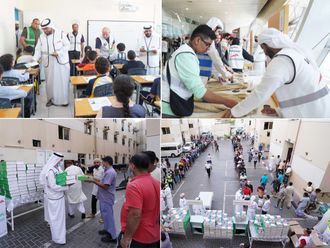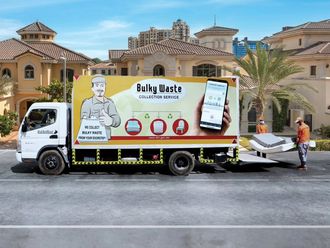Dr Bin Sulaiman |
Not a quarter passes by, to borrow a frame of reference critical to the IT sector, before DIC embarks on another venture.
What started off as a project to create a cluster of "knowledge" entities within a fixed geography, DIC is now looking to expand its physical horizons beyond its present location, and in its wake create a set of new clusters.
For the man at the helm of it all, these have been days of punishing 14 to 16 hour workdays, which often encroach into the weekends as well. In an exclusive to Gulf News, Dr. Omar Bin Sulaiman spreads his thoughts on the latest plans at DIC.
Gulf News: There has been so much talk lately about DIC looking at new locations to develop. True?
Dr. Omar Bin Sulaiman: Quite. In the fourth quarter, we should be finalising the details of the next phase of expansion, which will be on a totally greenfield site.
At the rate we have been expanding within the current location, there was no option but to look elsewhere. All the available space within DIC as it stands now has been taken. Land for expansion is not an issue at all in Dubai.
In some cases, we have already acquired the area for it. Dubai Media City has already announced the development of its International Media Production Zone, which is on the other side of the road.
With the new location, DIC can create a new set of clusters to come up. Another advantage we can derive is diverting some of the traffic to the new location. Even as we are constructing three buildings dedicated for parking, we find that we need to have more. Or create new sites for the offices.
Just recently, you allowed the private sector to take up the role of developing infrastructure within the current location by way of office towers. Will you let the private sector lead the next phase of expansion?
No. We have seen in the past that the private sector always waits for the government to put together the initial building blocks. When DIC was first created, we led all the development works, and it was only in the third year that we opened up to outside parties.
This is just natural - in a venture of this kind, the initiatives have to come from the government side. But a start has been made for partnering the private sector. It will continue in some form or the other in all future plans at DIC.
Recently, you merged the e-hosting services with that of Data Fort, the IT security services provider. The rationale?
We had two separate services, which we felt could derive our clients and us much bigger benefits if they were merged. Instead of two marketing teams approaching potential clients, it made business sense to have one offering a complete package.
Obviously there are cost benefits to us as well. But these are incidental.
DIC's e-hosting was done in conjunction with IBM. Are they still a partner after the recent changes?
Very much so. They are very much in the picture. The business generated this year from e-Hosting Data Fort is over and above what we expected.
It has been said that DIC might start offering full wireless connectivity within the entire free zone. What is the status of the programme?
As we speak, we have the capability to do so. In fact, the entire building housing DIC's corporate offices has already deployed the service. We could eventually deploy the service across the free zone. But factors such as demand and pricing need to be worked on. It is really important for us to determine whether the end user will be comfortable with the pricing we decide on.
You recently conducted an independent customer survey for the first time. Any startling findings?
To be quite honest, we did much better than I expected. When you provide over 1,100 products and services to the community, it is not easy to make everyone happy all the time.
If it were not for the parking problem, we should have ended with a much higher score. The survey showed that customers were happy with our services. About 84 per cent of customers surveyed said that they will recommend DIC/DMC services to others.
However, this exercise is not about scoring some numbers. It is to get to know your customer, and his needs, that much better. The challenge is how to make use of the findings to ensure we get things right as much as we can going forward.
What is the position of DIC with regard to emiratisation? Is there any pressure to meet any sort of numbers?
It is part of our obligation to develop the national workforce within the country. Our stance on this is no different from anyone else's.
At the same time, our organisation will continue to hire the smartest people from everywhere irrespective of nationality. We are looking for the best among UAE national candidates, who can cope up with the workload here and long hours. There are no free rides here. Only the best of the best can cope. You know what I mean?











